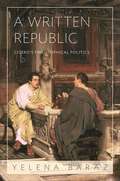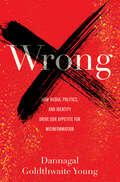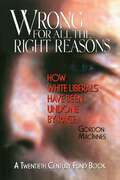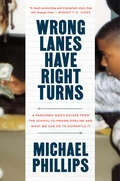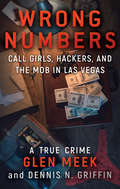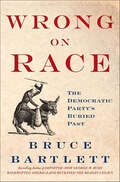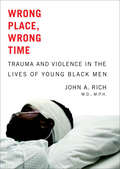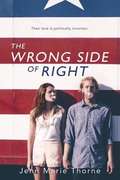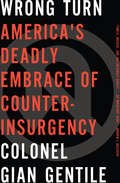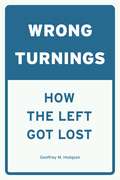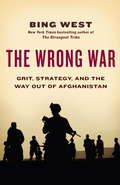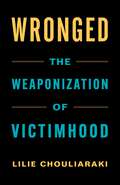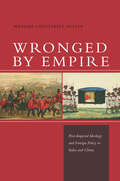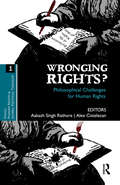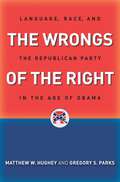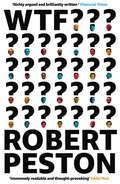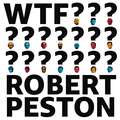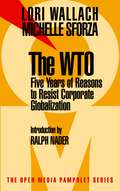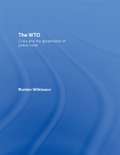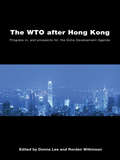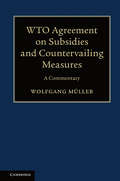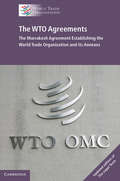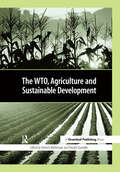- Table View
- List View
A Written Republic: Cicero's Philosophical Politics
by Yelena BarazIn the 40s BCE, during his forced retirement from politics under Caesar's dictatorship, Cicero turned to philosophy, producing a massive and important body of work. As he was acutely aware, this was an unusual undertaking for a Roman statesman because Romans were often hostile to philosophy, perceiving it as foreign and incompatible with fulfilling one's duty as a citizen. How, then, are we to understand Cicero's decision to pursue philosophy in the context of the political, intellectual, and cultural life of the late Roman republic? In A Written Republic, Yelena Baraz takes up this question and makes the case that philosophy for Cicero was not a retreat from politics but a continuation of politics by other means, an alternative way of living a political life and serving the state under newly restricted conditions. Baraz examines the rhetorical battle that Cicero stages in his philosophical prefaces--a battle between the forces that would oppose or support his project. He presents his philosophy as intimately connected to the new political circumstances and his exclusion from politics. His goal--to benefit the state by providing new moral resources for the Roman elite--was traditional, even if his method of translating Greek philosophical knowledge into Latin and combining Greek sources with Roman heritage was unorthodox. A Written Republic provides a new perspective on Cicero's conception of his philosophical project while also adding to the broader picture of late-Roman political, intellectual, and cultural life.
Wrong: How Media, Politics, And Identity Drive Our Appetite For Misinformation
by Dannagal Goldthwaite YoungWrong for All the Right Reasons: How White Liberals Have Been Undone by Race
by Gordon MacinnesThere was a time, in this century, when liberals championed the working class, when Democrats were indisputably the party of those who worked rather than invested for a living. Today, however, most Americans have come to see liberals as drifting and aimless, somehow lacking in backbone and moral fiber, beholden to radical ideologies that have little to do with the average American's life. Few incidents cast this phenomenon into greater relief than George Bush's successful tarring of Michael Dukakis as a liberal in 1988--and, tellingly, Dukakis's subsequent flight from the liberal tradition. How has it come to this? Why have liberals allowed themselves to be so portrayed? In this book, Gordon MacInnes--state senator, fiscal conservative, frustrated Democrat, and a man who believes deeply in America's civic culture--reveals how progressive forces have retreated from the battle of ideas, at great cost. Squarely at the nexus of race, poverty, and politics, Wrong for All the Right Reasons charts the sources of liberal decline and the high costs of conservative rule. Tracing the origins of the liberal retreat to the fall-out over Senator Daniel Patrick Moynihan's report on the black family in the 1960s, MacInnes claims that white liberals have somewhere along the way stopped taking black people seriously enough to argue with them. Continuously put on the desfensive, liberals have been unable to forge an aggressive, proactive agenda of that addresses the needs of working-class and poor Americans. This has led to a breakdown of honest dialogue which to this day continues to plague liberal Democrats, as evidenced by Bill Bradley's withdrawal from active party politics last fall. Finding room for optimism in the groundswell of grass-roots progressivism, Wrong for All the Right Reasons is a timely, necessary call to arms for liberal, progressive Democrats, outlining ways in which they can reverse their party's dangerous decline.
Wrong Lanes Have Right Turns: A Pardoned Man's Escape from the School-to-Prison Pipeline and What We Can Do to Dismantle It
by Michael PhillipsThe unforgettable true story of one man&’s escape from the school-to-prison pipeline, how he reinvented himself as a pastor and education reform advocate, and what his journey can teach us about turning the collateral damage in the lives of our youth into hope.&“A heart-wrenching and triumphant story that will change lives.&”—Bishop T. D. JakesMichael Phillips would never become anything. At least, that&’s what he was told. It seemed like everyone was waiting for him to just fall through the cracks. After losing his father, suffering a life-altering car accident, and losing his college scholarship, Michael turned to selling drugs to make ends meet. But when his house was raided, he was arrested and thrown into a living nightmare.When it looked like he would be sentenced to spend years behind bars, the judge gave him a choice—go to a special college program for adjudicated youth or face the possibility of a thirty-year prison sentence. It wasn&’t hard to pick. From that choice, a mission was born—to help change the system that shuffles so many young Black men like Michael straight from school to prison. Today, Michael is the pastor of a thriving church, a local leader in Baltimore, and a member of the Maryland State Board of Education. He discovered that education was the path to becoming who he was created to be. Armed with research, statistics, and his powerful story, Michael tackles the embedded privilege of the education system and introduces ideas for change that could level the playing field and reduce negative impacts on vulnerable youth. He explores ways in which the readers can help advocate and provide resources for students, and points us to the one thing anyone can start doing, no matter who we are or what our role is: speak into young kids&’ lives. Tell them of their inherent worth and purpose. In this inspiring, thought-provoking, and energizing call to action, Michael&’s practical steps provide a way forward to anyone wanting to help create space for collateral hope in the lives of for young people around them.
Wrong Numbers: Call Girls, Hackers, and the Mob in Las Vegas
by Dennis N. Griffin Glen MeekCybercrime meets organized crime in this true crime story about a hacker attempting to control Sin City&’s call-girl racket. Was a hacker diverting phone calls meant for Las Vegas escort services? The FBI wanted to know, and so did associates of a New York Mafia family. In one of the most unusual undercover operations ever, the FBI had an agent acting as a manager in a real Las Vegas escort service. Federal agents expected to find prostitution and drugs in the Las Vegas escort industry. What their investigation uncovered was even more serious . . . Praise for Wrong Numbers &“An intriguing and well-researched crime story detailing the intersection of big money and quick sex in the city that contains a lot of both.&” —Jack Sheehan, author of Skin City &“Wiseguys and wannabes are on the hunt for a shadowy hacker who may hold the keys to control of Las Vegas&’ multi-million dollar call girl racket, while FBI agents are hunting them. The result is a gripping true-life crime story that reads like a collaboration between Elmore Leonard and William Gibson told with the knowing savvy of two longtime chroniclers of Sin City&’s hidden underbelly.&” —Kevin Poulsen, author of Kingpin: How One Hacker Took Over the Billion-Dollar Cybercrime Underground &“In &’90s Vegas, call girls worked for &“entertainment&” services that were little more than phone numbers, dispatchers, and drop safes. When a mystery hacker started diverting customers&’ calls to one service&’s number, it launched a series of dangerous events that involved the Mob, feds, hackers, service owners, and the phone system itself. This slice of Sin City history is as little-known as it is thrilling, and it&’s well-told by investigative journalist Glen Meek and crime writer Dennis Griffin.&” —Deke Castleman, author of Whale Hunt in the Desert: Secrets of a Vegas Superhost
Wrong on Race: The Democratic Party's Buried Past
by Bruce BartlettIn Wrong on Race, Bruce Bartlett sets the record straight on a hidden past that many Democrats would rather see swept under the carpet. Ranging from the founding of the Republic through to today, it rectifies the unfair perceptions of America's two national parties. While Nixon's infamous "Southern Strategy" is constantly referenced in the media, less well remembered are Woodrow Wilson's segregation of the entire Federal civil service; FDR's appointment of a member of the KKK to the Supreme Court; John F. Kennedy's apathy towards civil rights legislation; and the ascension of Robert Byrd, who is current President pro tempore of the Senate, third in line in the presidential line of succession, and a former member of the KKK. For the last seventy years, African Americans have voted en masse for one party, with little in the end to show for it. Is it time for the pendulum to swing the other way? With the Republican Party furiously engaged in pre-2008 soul searching, this exhaustively researched, incisively written exposé will be an important and compelling component of that debate as we head towards November.
Wrong Place, Wrong Time: Trauma and Violence in the Lives of Young Black Men
by John A. RichNamed One of the Top 20 Books of 2009 by Cleveland Plain DealerMedical school taught John Rich how to deal with physical trauma in a big city hospital but not with the disturbing fact that young black men were daily shot, stabbed, and beaten. This is Rich's account of his personal search to find sense in the juxtaposition of his life and theirs.Young black men in cities are overwhelmingly the victims—and perpetrators—of violent crime in the United States. Troubled by this tragedy—and by his medical colleagues' apparent numbness in the face of it—Rich, a black man who grew up in relative safety and comfort, reached out to many of these young crime victims to learn why they lived in a seemingly endless cycle of violence and how it affected them. The stories they told him are unsettling—and revealing about the reality of life in American cities.Mixing his own perspective with their seldom-heard voices, Rich relates the stories of young black men whose lives were violently disrupted—and of their struggles to heal and remain safe in an environment that both denied their trauma and blamed them for their injuries. He tells us of people such as Roy, a former drug dealer who fought to turn his life around and found himself torn between the ease of returning to the familiarity of life on the violent streets of Boston and the tenuous promise of accepting a new, less dangerous one.Rich's poignant portrait humanizes young black men and illustrates the complexity of a situation that defies easy answers and solutions.
The Wrong Side of Right
by Jenn Marie ThorneFans of Sarah Dessen and Huntley Fitzpatrick will enjoy this smart debut young adult novel, equal parts My Life Next Door and The Princess Diaries--plus a dash of Aaron SorkinKate Quinn's mom died last year, leaving Kate parentless and reeling. So when the unexpected shows up in her living room, Kate must confront another reality she never thought possible--or thought of at all. Kate does have a father. He's a powerful politician. And he's running for U.S. President. Suddenly, Kate's moving in with a family she never knew she had, joining a campaign in support of a man she hardly knows, and falling for a rebellious boy who may not have the purest motives. This is Kate's new life. But who is Kate? When what she truly believes flies in the face of the campaign's talking points, she must decide. Does she turn to the family she barely knows, the boy she knows but doesn't necessarily trust, or face a third, even scarier option?Set against a backdrop of politics, family, and first love, this is a story of personal responsibility, complicated romance, and trying to discover who you are even as everyone tells you who you should be.
Wrong Turn: America's Deadly Embrace of Counter-Insurgency
by Colonel Gian GentileA searing indictment of US strategy in Afghanistan from a distinguished military leader and West Point military historian—&“A remarkable book&” (National Review). In 2008, Col. Gian Gentile exposed a growing rift among military intellectuals with an article titled &“Misreading the Surge Threatens U.S. Army&’s Conventional Capabilities,&” that appeared in World Politics Review. While the years of US strategy in Afghanistan had been dominated by the doctrine of counterinsurgency (COIN), Gentile and a small group of dissident officers and defense analysts began to question the necessity and efficacy of COIN—essentially armed nation-building—in achieving the United States&’ limited core policy objective in Afghanistan: the destruction of Al Qaeda. Drawing both on the author&’s experiences as a combat battalion commander in the Iraq War and his research into the application of counterinsurgency in a variety of historical contexts, Wrong Turn is a brilliant summation of Gentile&’s views of the failures of COIN, as well as a trenchant reevaluation of US operations in Afghanistan. &“Gentile is convinced that Obama&’s &‘surge&’ in Afghanistan can&’t work. . . . And, if Afghanistan doesn&’t turn around soon, the Democrats . . . who have come to embrace the Petraeus-Nagl view of modern warfare . . . may find themselves wondering whether it&’s time to go back to the drawing board.&” —The New Republic
Wrong Turnings: How the Left Got Lost
by Geoffrey M. HodgsonThe Left is in crisis. Despite global economic turbulence, left-wing political parties in many countries have failed to make progress in part because they have grown too ideologically fragmented. Today, the term Left is associated with state intervention and public ownership, but this has little in common with the original meaning of the term. What caused what we mean by the Left to change, and how has that hindered progress? With Wrong-Turnings, Geoffrey M. Hodgson tracks changes in the meaning of the Left and offers suggestions for how the Left might reclaim some of its core values. The term Left originated during the French Revolution, when revolutionaries sought to abolish the monarchy and privilege and to introduce a new society based on liberty, equality, fraternity, and universal rights. Over time, however, the meaning radically changed, especially through the influence of socialism and collectivism. Hodgson argues that the Left must rediscover its roots in the Enlightenment and readopt Enlightenment values it has abandoned, such as those concerning democracy and universal human rights. Only then will it be prepared to address contemporary problems of inequality and the survival of democracy. Possible measures could include enhanced educational provisions, a guaranteed basic income, and a viable mechanism for fair distribution of wealth.Wrong-Turnings is a truly pathbreaking work from one of our most prolific and respected institutional theorists. It will change our understanding of how the left got lost.
The Wrong War: Grit, Strategy, and the Way out of Afghanistan
by Bing WestAmerica cannot afford to lose the war in Afghanistan, and yet Americans cannot win it. In this definitive account of the conflict, acclaimed war correspondent and bestselling author Bing West provides a practical way out. Drawing on his expertise as both a combat-hardened Marine and a former assistant secretary of defense, West has written a tour de force narrative that shows the consequences when strategic theory meets tactical reality. Having embedded with dozens of frontline units over the past two years, he takes the reader on a battlefield journey from the mountains in the north to the opium fields in the south. West--dubbed "the grunt's Homer"--shows why the Taliban fear the ferocity of our soldiers. Each chapter, rich with vivid characters and gritty combat, illustrates a key component of dogged campaigns that go on for years. These never-ending battles show why idealistic theories about counterinsurgency have bogged us down for a decade. The official rhetoric denies reality. Instead of turning the population against the Taliban, our lavish aid has created a culture of entitlement and selfishness. Our senior commanders are risk-averse, while our troops know the enemy respects only the brave. A fighter who understands strategy, West builds the case for changing course. As long as we do most of the fighting, the Afghans will hold back. Yet the Afghan military will crumble without our combat troops. His conclusion is sure to provoke debate: remove most of the troops from Afghanistan, stop spending billions on the dream of a modern democracy, transition to a tough adviser corps, and insist the Afghans fight their own battles. Amid debate about this maddening war, Bing West's book is a page-turner about brave men and cunning enemies that examines our realistic choices as a nation.From the Hardcover edition.
Wronged: The Weaponization of Victimhood
by Lilie ChouliarakiWhy is being a victim such a potent identity today? Who claims to be a victim, and why? How have such claims changed in the past century? Who benefits and who loses from the struggles over victimhood in public culture?In this timely and incisive book, Lilie Chouliaraki shows how claiming victimhood is about claiming power: who deserves to be protected as a victim and who should be punished as a perpetrator. She argues that even though victimhood has long been used to excuse violence and hierarchy, social media platforms and far-right populism have turned victimhood into a weapon of the privileged. Drawing on recent examples such as the overturning of Roe v. Wade, movements like #MeToo and Black Lives Matter, and the COVID-19 pandemic, as well as historical ones from the major wars of the twentieth century and the Civil Rights Movement, Wronged reveals why claims of victimization are so effective at reinforcing instead of alleviating inequalities of class, gender, and race. Unless we come to recognize the suffering of the vulnerable for what it is—a matter not of victimhood but of injustice—Chouliaraki powerfully warns, the culture of victimhood will continue to perpetuate old exclusions and enable further injuries.
Wronged by Empire: Post-Imperial Ideology and Foreign Policy in India and China
by Manjari Chatterjee MillerAlthough India and China have very different experiences of colonialism, they respond to that history in a similar way-by treating it as a collective trauma. As a result they have a strong sense of victimization that affects their foreign policy decisions even today. Wronged by Empire breaks new ground by blending this historical phenomenon, colonialism, with mixed methods-including archival research, newspaper data mining, and a new statistical method of content analysis-to explain the foreign policy choices of India and China: two countries that are continuously discussed but very rarely rigorously compared. By reference to their colonial past, Manjari Chatterjee Miller explains their puzzling behavior today. For example, she demonstrates why in important cases (such as India going nuclear in 1998 or China's fraught relationship with Japan) their foreign policy behavior is not consistent with the security explanations that are dominant in international relations. More broadly, she argues that the transformative historical experience of a large category of actors-ex-colonies, who have previously been neglected in the study of international relations-can be used as a method to categorize states in the international system. In the process Miller offers a more inclusive way to analyze states than do traditional theories of international relations, which usually focus on the material power of states, meaning inevitably that they mostly discuss the behavior of states that have power enough to matter-in effect Western states.
Wronging Rights?: Philosophical Challenges for Human Rights (Ethics, Human Rights and Global Political Thought)
by Aakash Singh Rathore Alex CistelecanThis book brings together two of the most powerful and relevant philosophical critiques of human rights: the post-colonialist and the post-Althusserian, its balanced internal structure not just throwing these two critiques together, but actually forcing them to enter into confrontation and dialogue. The book is organised in three parts: at each end, the post-colonialist and the post-Althusserian critiques are represented by some of their main thinkers (Ratna Kapur, G. C. Spivak, Upendra Baxi; Slavoj Žižek, Jacques Rancière), while in the middle, an American intermezzo (Richard Rorty, Wendy Brown) functions as a genuine Derridian supplement: always already contaminating the purity of the two theoretical schools, preventing their enclosure and, hence, fuelling and complicating further their mutual confrontation. As in any authentic dialogue, the introduction and the conclusion each claim victory for one of the sides by changing the very terms and rules of the dialogue, picturing it as a confrontation between emancipatory universalism and inefficient particularism (from the perspective of the post-Althusserians), or as a split between hypocrisy and truth (from the perspective of the post-colonialists).
The Wrongs of the Right: Language, Race, and the Republican Party in the Age of Obama
by Gregory S. Parks Matthew W. HugheyOn November 5, 2008, the nation awoke to a New York Times headline that read triumphantly: "OBAMA. Racial Barrier Falls in Heavy Turnout." But new events quickly muted the exuberant declarations of a postracial era in America: from claims that Obama was born in Kenya and that he is not a true American, to depictions of Obama as a "Lyin African" and conservative cartoons that showed the new president surrounded by racist stereotypes like watermelons and fried chicken. Despite the utopian proclamations that we are now live in a color-blind, postracial country, the grim reality is that implicit racial biases are more entrenched than ever. In Wrongs of the Right, Matthew W. Hughey and Gregory S. Parks set postracial claims into relief against a background of pre- and post-election racial animus directed at Obama, his administration, and African Americans. They provide an analysis of the political Right and their opposition to Obama from the vantage point of their rhetoric, a history of the evolution of the two-party system in relation to race, social scientific research on race and political ideology, and how racial fears, coded language, and implicit racism are drawn upon and manipulated by the political Right. Racial meanings are reservoirs rich in political currency, and the Right's replaying of the race card remains a potent resource for othering the first black president in a context rife with Nativism, xenophobia, white racial fatigue, and serious racial inequality. And as Hughey and Parks show, race trumps politics and policies when it comes to political conservatives' hostility toward Obama.
WTF?: A Times top 10 bestseller
by Robert PestonTHE TOP 10 BESTSELLER'Richly argued and brilliantly written... a deeply thoughtful analysis that should be mandatory reading for anyone seeking to understand where we have gone wrong.' Vernon Bogdanor, Financial TimesIn WTF? Robert Peston draws on his years of experience as a political, economics and business journalist to show us what has gone bad and gives us a manifesto to put at least some of it right. Framed by two letters to his father (who died in early 2016) WTF? is Robert Peston's highly personal account of what those who have ruled us for years got so badly wrong, and what we need to do to mend the terrible fractures in our society.With characteristic passion and clarity he looks at what must happen to prevent democracy being subverted by technocratic geniuses with the ability to manipulate social media, how and whether it is possible to make a success of leaving the EU, what the lessons should be of the appalling Grenfell Tower tragedy, whether robots can be stopped from taking our work, what can be done to staunch the widening gap between rich and poor, and how to raise living standards for all.WTF? is a trenchant, often entertaining account of the recent past. It is also a call to action, giving hope to all of us who believe that taking back control is not only vital, but possible.'A manual for our times that everyone should read.' Matthew d'Ancona
WTF?: A Times top 10 bestseller
by Robert PestonTHE TOP 10 BESTSELLER 'Richly argued and brilliantly written... a deeply thoughtful analysis that should be mandatory reading for anyone seeking to understand where we have gone wrong.' Vernon Bogdanor, Financial Times In WTF? Robert Peston draws on his years of experience as a political, economics and business journalist to show us what has gone bad and gives us a manifesto to put at least some of it right. Framed by two letters to his father (who died in early 2016) WTF? is Robert Peston's highly personal account of what those who have ruled us for years got so badly wrong, and what we need to do to mend the terrible fractures in our society. With characteristic passion and clarity he looks at what must happen to prevent democracy being subverted by technocratic geniuses with the ability to manipulate social media, how and whether it is possible to make a success of leaving the EU, what the lessons should be of the appalling Grenfell Tower tragedy, whether robots can be stopped from taking our work, what can be done to staunch the widening gap between rich and poor, and how to raise living standards for all. WTF? is a trenchant, often entertaining account of the recent past. It is also a call to action, giving hope to all of us who believe that taking back control is not only vital, but possible. 'A manual for our times that everyone should read.' Matthew d'Ancona
The WTO: Five Years of Reasons to Resist Corporate Globalization (Open Media Series)
by Ralph Nader Lori Wallach Michelle SforzaIn this groundbreaking pamphlet, directors of Ralph Nader's Public Citizen group examine the first five years of the World Trade Organization's track record, demonstrating how the WTO aims to create a new global economic system that increases corporate profit with little regard for social and ecological impacts, or democratically enacted law. Wallach and Sforza make clear recommendations for altering the undemocratic course that the WTO imposes on democratic society.
The WTO: Crisis and the Governance of Global Trade
by Rorden WilkinsonRorden Wilkinson explores the factors behind the collapse of World Trade Organisation (WTO) ministerials – as in Seattle in 1999 and Cancun in 2003 – and asks why such events have not significantly disrupted the development of the multilateral trading system. He argues that the political conflicts played out during such meetings, their occasional collapse and the reasons why such events have so far not proven detrimental to the development of the multilateral trading system can be explained by examining the way in which the institution was created and has developed through time. In addition, this new text: explores the development of the multilateral trading system from the creation of the General Agreement on Tariffs and Trade (GATT) in 1947 to the WTO’s Hong Kong ministerial in December 2005 examines the way in which the interaction of member states has been structured by the institution’s development assesses the impact of institutional practices and procedures on the heightening of political tensions and explains why WTO ministerials exhibit a propensity to collapse but why the breakdown of a meeting has so far not prevented the institution from moving forward This book will be of interest to scholars and students of international politics, economics and law
WTO Accessions and Trade Multilateralism
by Dadush, Uri and Osakwe, Chiedu Uri Dadush Chiedu OsakweWhat have WTO accessions contributed to the rules-based multilateral trading system? What demands have been made by original WTO members on acceding governments? How have the acceding governments fared? This volume of essays offers critical readings on how WTO accession negotiations have expanded the reach of the multilateral trading system not only geographically but also conceptually, clarifying disciplines and pointing the way to their further strengthening in future negotiations. Members who have acceded since the WTO was established now account for twenty per cent of total WTO membership. In the age of globalization there is an increased need for a universal system of trade rules. Accession negotiations have been used by governments as an instrument for domestic reforms, and one lesson from the accession process is that there are contexts which lead multilateral trade negotiations to successful outcomes even in the complex and multi-polar twenty-first century economic environment.
The WTO after Hong Kong: Progress in, and Prospects for, the Doha Development Agenda
by Rorden Wilkinson Donna LeeAfter the World Trade Organization’s (WTO) critical December 2005 Hong Kong ministerial meeting, negotiations to implement the Doha Development Agenda (DDA) broke down completely in the summer of 2006. This book offers a detailed and critical evaluation of how and why the negotiations arrived at this point and what the future holds for the WTO. It brings together leading scholars in the field of trade from across the social sciences who address the key issues at stake, the principal players in the negotiations, the role of fairness and legitimacy in the Doha Round, and the prospects for the DDA’s conclusion. The WTO after Hong Kong is the most comprehensive account of the current state of the World Trade Organization and will be of enormous interest to students of trade politics, international organizations, development and international political economy.
WTO Agreement on Subsidies and Countervailing Measures: A Commentary
by Wolfgang MüllerPanels and the WTO Appellate Body have rendered a large number of complex and lengthy rulings on the Agreement on Subsidies and Countervailing Measures. The reasoning behind these rulings is often intimately linked to the underlying facts of a particular case and the methods of litigation adopted by the parties. Without guidance, it is difficult to find and research a specific subsidy issue quickly. This book provides an essential article-by-article commentary on the Agreement and sets out the law as it emerges from this body of rulings, providing the legal basis for further analysis of subsidy disciplines within the realms of economics and political science. It also includes a useful summary of the negotiating history and the links to other WTO Agreements such as GATT 1994. This important reference work will appeal to international trade lawyers, government officials, researchers, students of international trade law, business associations and NGOs. Provides an article-by-article commentary of the Agreement in simple language, encouraging a fuller understanding of the Agreement's provisions. Includes an overview of the relevant jurisprudence so that the reader can locate specific areas of interest. Considers relevant scholarly writing, enabling the reader to gain a broader perspective beyond the Agreement itself.
The WTO Agreements: The Marrakesh Agreement Establishing the World Trade Organization and its Annexes
by World Trade OrganizationThis publication contains the text of the WTO's founding agreement, the 1994 Marrakesh Agreement Establishing the World Trade Organization, and its Annexes, including all amendments and additions since its entry into force until September 2017. <P><P>These include an amendment to the WTO's intellectual property agreement (TRIPS Agreement) aimed at improving developing countries' access to medicines, the WTO's Trade Facilitation Agreement, which entered into force in February 2017, an amendment adopted in July 2017 to extend the frequency of peer review periods under the Trade Policy Review Mechanism as of 2019, and the amended Government Procurement Agreement. <P>This publication updates and replaces The Legal Texts: The Results of the Uruguay Round of Multilateral Trade Negotiations, which was first printed in 1994. <P>Includes the complete and official texts of the WTO agreements in one collection.<P> Provides an indispensable guide to all WTO trade-related negotiations.<P> Updates and replaces The Legal Texts: The Results of the Uruguay Round of Multilateral Trade Negotiations (1994).
The WTO, Agriculture and Sustainable Development
by Heinrich Wohlmeyer Theodor QuendlerDespite the Doha declaration of November 2001, the failure to start a new round of global trade negotiations at Seattle in December 1999 and the hostility of protesters to the trade liberalization process and growing global economic and social disparities was a wake-up call for the World Trade Organisation (WTO). The ambitious goal of this ground-breaking book is to identify the strengths and weaknesses of liberalized world trade, in particular in the agricultural sector, and to investigate to what extent the current WTO agreements provide the necessary fail-safe devices to react to trade-related negative impacts on sustainability, environmental protection and food security. The background and interrelationship between the WTO, the tenets of sustainable development and the unique features of the agriculture and forestry sectors are explored, and conclusions regarding the deficits of the world trade system and its conflicts with basic societal goals – such as sustainability – are drawn. Agriculture and forestry have a particular affinity with what the authors call "strong sustainability" and are to be among the major agenda items in forthcoming WTO negotiations. The book proposes that sustainable agricultural production techniques such as integrated and organic farming provide a series of related services to community and environment which could be severely prejudiced by wholesale trade liberalization and the imposition of the large-scale production methods of the mega-trade giants of the USA and Europe. And yet the concept of sustainability is referred to only tangentially in the existing WTO agenda. The WTO, Agriculture and Sustainable Development argues that, without a formal recognition of this failing, the premise that free trade is inherently advantageous for all countries is a falsehood. Further, unfettered liberalization is unsustainable and a social and environmental multilateral framework must be agreed to reinterpret or adapt a host of WTO regulations that are at odds with sustainable development. The core problem is that, under the current system, import duties can only be differentiated by direct goods and services and not by their means of production – sustainable or otherwise. Therefore, a range of environmental policy measures in the agricultural sector, such as the consideration of product life-cycles, the internalization of external costs and a coupling of trade liberalization with ecological obligations are proposed by the authors. In addition, they argue that unsustainable economic short-termism must be curbed and the use of the stick of trade sanctions and the carrot of financial benefits for good environmental performance be permitted to promote sustainable agricultural practices. This book will contribute greatly in addressing the lack of basic theoretical arguments at the intersection between trade and sustainable development – a failing that has already been bemoaned by trade policy-makers. It is highly recommended reading for all those involved or interested in the WTO negotiations, whether from multilateral organizations, governments, industry or civil society.
WTO Analytical Index
by Legal Affairs Division World Trade OrganizationThe WTO Analytical Index is a comprehensive guide to the interpretation and application of the WTO Agreements by the Appellate Body, dispute settlement panels and other WTO bodies. It contains extracts of key pronouncements and findings from tens of thousands of pages of WTO jurisprudence, including panel reports, Appellate Body reports, Article 21.3(c) awards and Article 22.6 decisions. This unique work will be of assistance to anyone working in the field of WTO law, including lawyers, economists, academics and students. It is produced by the Legal Affairs Division of the WTO Secretariat with contributions from other divisions of the Secretariat and the Appellate Body Secretariat. The third edition of the WTO Analytical Index covers developments in WTO law and practice over the period January 1995 to September 2011.
